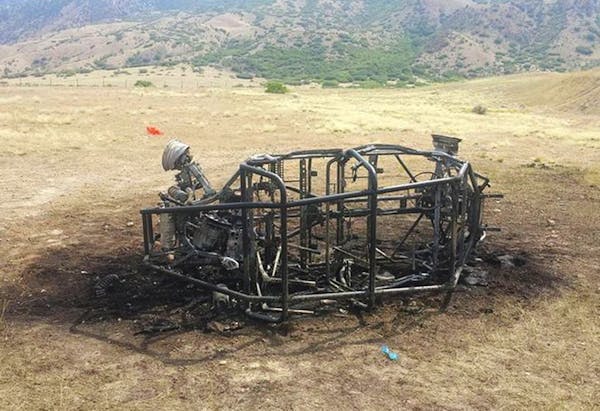Repercussions from Polaris Industries' massive recalls hammered home Monday as the recreational vehicle maker significantly downgraded its earnings expectations for the year, saying recall costs will now reach $120 million in 2016.
The surprise downgrade, which lowered the earnings forecast by 43 percent, comes less than two weeks after Polaris recalled another 10,770 of its off-road four-wheelers, citing 19 new reports of vehicle fires that injured six people and destroyed 15 acres of Utah forest.
This month's recalls are on top of the 203,000 recreational vehicles that Medina-based Polaris previously recalled between 2015 and July due to a variety of fire hazards.
"Our No. 1 priority is to get our loyal owners back to riding safely," said Polaris CEO Scott Wine in a prepared statement. "We share the frustration of our customers and dealers, and we are working diligently to expedite the completion of the recall repairs and significantly improve the quality and safety of our products. We are providing increased support to our dealers and RZR owners so they can complete the necessary repairs with minimal disruption."
The latest recall involves Polaris' RZR Turbo vehicles that had fire trouble, including one in which a small child was severely burned.
As of April, more than 100 of Polaris' side-by-side vehicles had burst into flames, one killing a 15-year-old girl. On Sept. 2, two Arizona women were reportedly killed in Moab, Utah, after their 2010 Polaris Ranger vehicle tipped over during an obstacle course and caught on fire. At least one of the women's families retained the Eisenberg, Gilchrist & Cutt law firm in Salt Lake City.
Polaris spokeswoman Kelly Basgen said the women's vehicle caught fire because of the crash, not a product defect.
"Our thoughts and prayers are with the riders' families," she said. "Based on information obtained from investigating authorities, the crash and resulting fire that took place in a highly technical riding area — referred to as the Tip-Over Challenge — were not related to our recalls."
As far as the other reported fires, "Polaris takes these matters very seriously and the safety of our customers is our top priority," she said.
Attorney Jeff Eisenberg said he is representing the mother of one of the deceased women, plus three other families whose relatives were injured from Polaris vehicle fires. Only one of his clients, John Hill of Weber County, Utah, has filed a product defect lawsuit to date. It seeks compensation for burns, disfigurement and loss of income from the sudden fire of his 2014 Polaris RZR XP 1000. Other law firms have cases pending against Polaris in Texas and California, Eisenberg said.
"This is not a normal product defect," Eisenberg said. "I don't think that the normal person appreciates the gravity of danger when one of these vehicle catches on fire. You have a matter of seconds to recognize the fire and get off the vehicle. If you don't, the consequences can be severe."
He urged people receiving recall notices to get their vehicles fixed right away.
Polaris officials declined to comment on litigation or injuries but also urged consumers receiving recall notices to stop using the affected machines and to get their free repair immediately.
The company, a longtime Wall Street favorite, has scrambled to get control of and eliminate the various fire-related problems that have impacted various model years and makes. U.S. Consumer Product Safety Commission notices blamed some of the fire hazards on overheated vehicles; oil leaks in drain lines; loose drain lines; and installation errors that pinched fuel tank vent lines.
The product recalls started in January 2015. Most addressed Polaris' off-road four-wheelers, however a few thousand involved Polaris' snowmobiles and its three-wheeler Slingshot motorcycle.
Remedies have included extensive testing, recall, warranty and legal costs, hiring outside engineers, delaying select 2017 model introductions and issuing new promotions designed to get consumers back into dealerships. Combined, Polaris expects to pay about $120 million this year in relation to the recalls, officials said Monday.
That is a dramatic increase from the previously disclosed $30 million spent during the first quarter and the $25 million spent during the second quarter of 2016.
As a result, the company now expects full-year 2016 earnings of $3.30 to $3.80 per share. That is $2.50 to $2.70 per share lower than previously expected. The bulk of the reduction is expected in the third quarter, officials said.
Polaris also expects 2016 sales to fall "in the mid-to-high single-digit percent range." It previously forecast that sales could be flat or fall as much as 2 percent.
Polaris' stock fell 8 percent early Monday morning, but recovered somewhat to close at $76.79, down about 5 percent or $4.05 per share. The price is down significantly from the $152 price Polaris enjoyed last summer.
Dee DePass • 612-673-7725

